SHORT TAKE:
Delightful loose retelling of the adventures of Tom Sawyer and Huckleberry Finn with “shades” of St. Augustine’s philosophical wisdom.
WHO SHOULD GO:
Mid-teens and up as, while there is no sexual content, the film contains some rough language, and brief scenes of violence and tension. Also, younger kids would probably be bored with the slow and thoughtful pace of the story.
LONG TAKE:
Some reviewers have noted the similarities in the The Peanut Butter Falcon to both Tom Sawyer and Huckleberry Finn, especially Finn’s trip down the Mississippi with the run away slave, Jim. And while this is true, this aspect of the debut feature length script, as brilliantly and simply co-written and co-directed by 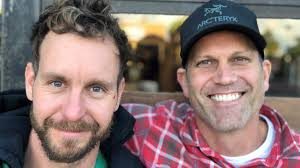 Tyler Nilson and Michael Schwartz, inspired in part as a love letter to the people of the Outer Banks, is only the superficial structure to a story with far deeper and more complex theological implications.
Tyler Nilson and Michael Schwartz, inspired in part as a love letter to the people of the Outer Banks, is only the superficial structure to a story with far deeper and more complex theological implications.
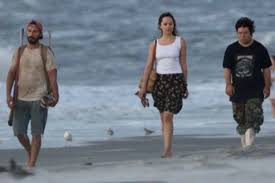 St. Augustine once said: Trust the past to God’s mercy, the present to God’s love, and the future to His Providence. The Peanut Butter Falcon is the embodiment of this lesson as it brings to life three unusual but very relatable people who collide in one of the most charming and delightful movies I have seen in a long time.
St. Augustine once said: Trust the past to God’s mercy, the present to God’s love, and the future to His Providence. The Peanut Butter Falcon is the embodiment of this lesson as it brings to life three unusual but very relatable people who collide in one of the most charming and delightful movies I have seen in a long time.
Tyler, namesake of the co-author, played by Shia LaBeouf, is a darker version of Huckleberry Finn‘s Jim.  Tyler is a walking guilt trip, desperately in need of mercy, an unhappy man with a tragic history looking to punish himself for the regrets in his life. He is the only one for which we see flashbacks, underscoring Tyler’s obsession with the past. An unsuccessful fisherman, he is angry with the world, especially himself and runs away from his responsibilities, one step ahead of justice for his petty and vengeance-inspired crimes as well as the rough and dangerous men who he has infuriated.
Tyler is a walking guilt trip, desperately in need of mercy, an unhappy man with a tragic history looking to punish himself for the regrets in his life. He is the only one for which we see flashbacks, underscoring Tyler’s obsession with the past. An unsuccessful fisherman, he is angry with the world, especially himself and runs away from his responsibilities, one step ahead of justice for his petty and vengeance-inspired crimes as well as the rough and dangerous men who he has infuriated.
 But there is also a blunt honesty about the way he treats his fellow man. In Act 5 of George Bernard Shaw’s play Pygmalion, Eliza Doolittle rebukes her bombastic tutor Henry Higgins, complaining that the manners of Higgins’ friend Colonel Pickering are better than Higgins’ manners because:
But there is also a blunt honesty about the way he treats his fellow man. In Act 5 of George Bernard Shaw’s play Pygmalion, Eliza Doolittle rebukes her bombastic tutor Henry Higgins, complaining that the manners of Higgins’ friend Colonel Pickering are better than Higgins’ manners because:  “He [Pickering] treats a flower girl as if she was a duchess.” To which Higgins retorts: “And I treat a duchess as if she was a flower girl.” There is a bit more than a little of Henry Higgins in The Peanut Butter Falcon’s Tyler.
“He [Pickering] treats a flower girl as if she was a duchess.” To which Higgins retorts: “And I treat a duchess as if she was a flower girl.” There is a bit more than a little of Henry Higgins in The Peanut Butter Falcon’s Tyler.
Tyler is the best role of LaBeouf’s career to date. His character looks at the world with sad eyes but squarely.  When Zak, to garner a bit of sympathy, announces to Tyler that he has Down Syndrome, Tyler tells him he doesn’t care. And Tyler means it. With gruff respect for his new tag-along companion, Tyler genuinely does not care one way or the other that Zak has “special needs”,
When Zak, to garner a bit of sympathy, announces to Tyler that he has Down Syndrome, Tyler tells him he doesn’t care. And Tyler means it. With gruff respect for his new tag-along companion, Tyler genuinely does not care one way or the other that Zak has “special needs”, 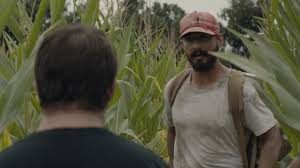 but treats Zak the way he does everyone, including a nervous grocery clerk, the blind preacher who gives them shelter, the lovely Eleanor, the man who gives him a hitch, the employer who has just fired him – all with the same respect – meeting everyone at eye level, not caring what they think of him,
but treats Zak the way he does everyone, including a nervous grocery clerk, the blind preacher who gives them shelter, the lovely Eleanor, the man who gives him a hitch, the employer who has just fired him – all with the same respect – meeting everyone at eye level, not caring what they think of him,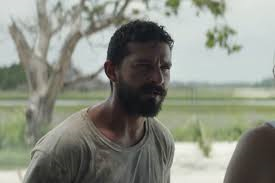 but offering each a measure of decency the best way he knows how.
but offering each a measure of decency the best way he knows how.
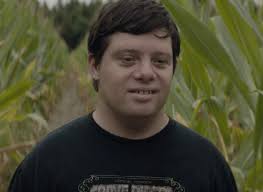 Zak, the main character in this film with the quirky title, is a wonderful modern day Tom Sawyer/Huckleberry Finn. Brave and adventurous, Zak even spends much of the first parts of his journey, like Tom and Huck, barefooted, walking down country roads with his ersatz “Jim”. Zak had been stuck in a nursing home as, abandoned by his family, no other place would take him. But Zak is also the personification of unconditional love, a sweet soul with an indefatigably happy outlook on life, who lives in every present moment with trust in God, unbounded enthusiasm and an open heart.
Zak, the main character in this film with the quirky title, is a wonderful modern day Tom Sawyer/Huckleberry Finn. Brave and adventurous, Zak even spends much of the first parts of his journey, like Tom and Huck, barefooted, walking down country roads with his ersatz “Jim”. Zak had been stuck in a nursing home as, abandoned by his family, no other place would take him. But Zak is also the personification of unconditional love, a sweet soul with an indefatigably happy outlook on life, who lives in every present moment with trust in God, unbounded enthusiasm and an open heart. 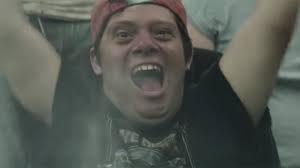 Played brilliantly by a young man who actually has Down’s Syndrome, the clever and adorable Zack Gottsagen, some of whose clever ad-libs were included in the script, is charm personified.
Played brilliantly by a young man who actually has Down’s Syndrome, the clever and adorable Zack Gottsagen, some of whose clever ad-libs were included in the script, is charm personified.
The chemistry between the three leads is obvious both on and off screen. Gottsagen’s co-stars LeBoeuf and Johnson, in the “Making of” featurette HERE and interviews like the ones HERE, and HERE, and HERE, express what seems to be genuine fondness for their new fellow thespian, as well as admiration for his natural acting abilities and instincts.
The film’s titular Peanut Butter Falcon, Zak, also looks squarely and honestly at the world, but sees it very differently from Tyler. 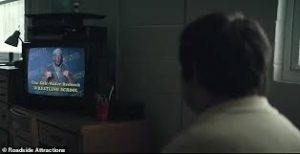 More than anything in the world Zak wants to be a professional wrestler like
More than anything in the world Zak wants to be a professional wrestler like 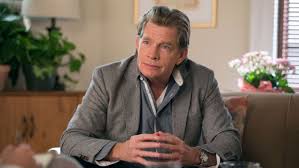 Salt Water Redneck, (Thomas Hayden Church) whose videos Zak watches ceaselessly with his friend and endlessly patient roommate,
Salt Water Redneck, (Thomas Hayden Church) whose videos Zak watches ceaselessly with his friend and endlessly patient roommate, 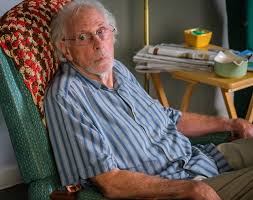 Carl (Bruce Dern – classic veteran of stage and screen whose now elderly and experienced presence I have been delighted to see cropping up in such divergent films as Chappaquidick and Once Upon a Time in Hollywood). Zak flees the nursing home in pursuit of his dream.
Carl (Bruce Dern – classic veteran of stage and screen whose now elderly and experienced presence I have been delighted to see cropping up in such divergent films as Chappaquidick and Once Upon a Time in Hollywood). Zak flees the nursing home in pursuit of his dream.
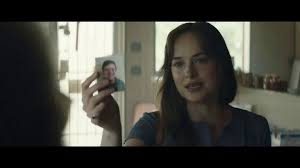 Eleanor stands in the place of Tom’s Aunt Polly. Like the Biblical Martha, Eleanor is worried and upset about many things, fearful of the bad things that can happen to the people about and for whom she cares, not the least of which is the “flight risk” Zak, as this escape is not his first. Eleanor is a young widow who spends her time volunteering at the elderly home.
Eleanor stands in the place of Tom’s Aunt Polly. Like the Biblical Martha, Eleanor is worried and upset about many things, fearful of the bad things that can happen to the people about and for whom she cares, not the least of which is the “flight risk” Zak, as this escape is not his first. Eleanor is a young widow who spends her time volunteering at the elderly home. 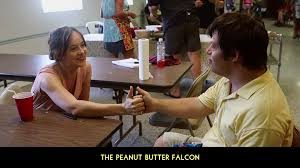 She worries over Zak like a mother hen, fretting exclusively about his future, blinding herself to Zak’s immediate needs and manifest abundant abilities. When Zak goes missing, Eleanor strikes out on the seemingly impossible task to find Zak and return him to what she believes is the best place for him – the safety of her ever watchful eye.
She worries over Zak like a mother hen, fretting exclusively about his future, blinding herself to Zak’s immediate needs and manifest abundant abilities. When Zak goes missing, Eleanor strikes out on the seemingly impossible task to find Zak and return him to what she believes is the best place for him – the safety of her ever watchful eye.
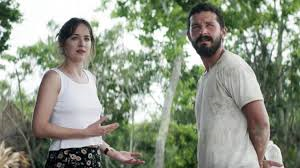 The actress who played Eleanor looked extremely familiar, though, in a rarity for me, I could not place her. Then I looked her up in the vast electronic cinematic library that is us.imdb.com only to find she had been in a trilogy for which her face was plastered everywhere, but which movies I had not seen. Dakota Johnson made her name as the notorious co-star of the rather infamous Shades of Gray films.
The actress who played Eleanor looked extremely familiar, though, in a rarity for me, I could not place her. Then I looked her up in the vast electronic cinematic library that is us.imdb.com only to find she had been in a trilogy for which her face was plastered everywhere, but which movies I had not seen. Dakota Johnson made her name as the notorious co-star of the rather infamous Shades of Gray films.  But fear not, as my husband wittily suggested I assure you, this is NOT 50 Shades of Peanut Butter. However, there IS a completely innocent but rather amusing Easter egg reference to the Gray films for those familiar with this portion of Ms. Johnson’s repertoire. Assessing her filmography, I believe this is likely the best performance of her career and certainly the nicest movie she has ever been in.
But fear not, as my husband wittily suggested I assure you, this is NOT 50 Shades of Peanut Butter. However, there IS a completely innocent but rather amusing Easter egg reference to the Gray films for those familiar with this portion of Ms. Johnson’s repertoire. Assessing her filmography, I believe this is likely the best performance of her career and certainly the nicest movie she has ever been in.
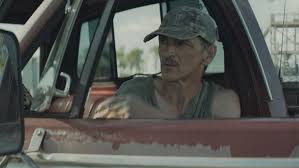 Duncan, (John Hawkes who has appeared in such varied features as the comedy TV show Psyche, as the Union colonel Robert Latham in Lincoln, and the frighteningly abusive husband in Three Billboards Outside Ebbing, Missouri), is most obviously this version of Tom Sawyer‘s Injun Joe. Duncan hunts relentlessly for Tyler and, by extension, his companions, bent on revenge.
Duncan, (John Hawkes who has appeared in such varied features as the comedy TV show Psyche, as the Union colonel Robert Latham in Lincoln, and the frighteningly abusive husband in Three Billboards Outside Ebbing, Missouri), is most obviously this version of Tom Sawyer‘s Injun Joe. Duncan hunts relentlessly for Tyler and, by extension, his companions, bent on revenge.
 Together the three friends – Tyler, Eleanor and Zak – embark upon a Twain-ian adventure which literally places them, for a while, on a raft down a river.
Together the three friends – Tyler, Eleanor and Zak – embark upon a Twain-ian adventure which literally places them, for a while, on a raft down a river.
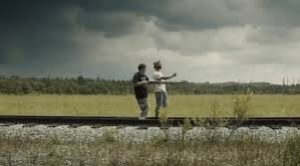 The cinematography is like a stylized home movie. Beautifully filmed in Savannah, Georgia, making best use of the natural biodiversities from man-tall grasses and
The cinematography is like a stylized home movie. Beautifully filmed in Savannah, Georgia, making best use of the natural biodiversities from man-tall grasses and  long stretches of sandy beaches to inviting swimming holes and Spanish Moss-covered oaks, much of the story is set along the Outer Banks – a series of barrier islands and spits along the east coast of North Carolina and Virginia, as our characters make their way to Florida.
long stretches of sandy beaches to inviting swimming holes and Spanish Moss-covered oaks, much of the story is set along the Outer Banks – a series of barrier islands and spits along the east coast of North Carolina and Virginia, as our characters make their way to Florida.
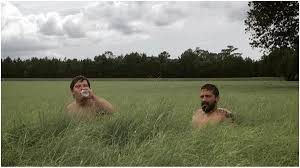 The music is very reminiscent of O Brother, Where Art Thou? – a mellow expression of Southern culture featuring a soundtrack of banjo picking and fiddle music, with folk songs and Gospel tunes sprinkled throughout, like stars in the black velvet sky of a summer night.
The music is very reminiscent of O Brother, Where Art Thou? – a mellow expression of Southern culture featuring a soundtrack of banjo picking and fiddle music, with folk songs and Gospel tunes sprinkled throughout, like stars in the black velvet sky of a summer night.
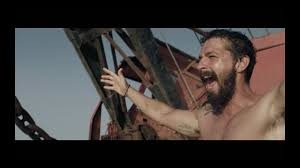 The language is occasionally quite rough, but not gratuitously so, and certainly in keeping with the customs of the financially precarious crab fishermen who live from hand to mouth on the outskirts of civilization, in the wilds of Georgia.
The language is occasionally quite rough, but not gratuitously so, and certainly in keeping with the customs of the financially precarious crab fishermen who live from hand to mouth on the outskirts of civilization, in the wilds of Georgia.
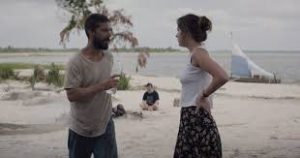 There is no sexual content aside from the underweared attire of the purely innocent Zak’s escape ensemble, and a chaste kiss between our other two protagonists.
There is no sexual content aside from the underweared attire of the purely innocent Zak’s escape ensemble, and a chaste kiss between our other two protagonists.
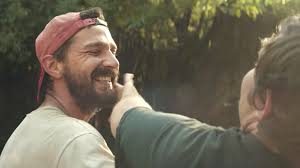 So go enjoy this wonderful expression of both a modern Mark Twain tale and the personification of St. Augustine’s admonition to seek God’s mercy, love and Providence, as seen through the eyes and adventures of a very special Huckleberry Finn and his two companions.
So go enjoy this wonderful expression of both a modern Mark Twain tale and the personification of St. Augustine’s admonition to seek God’s mercy, love and Providence, as seen through the eyes and adventures of a very special Huckleberry Finn and his two companions.

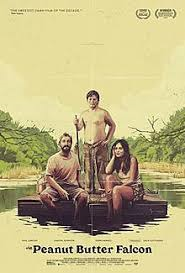
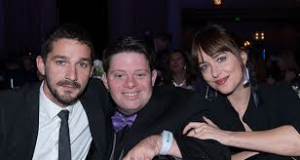
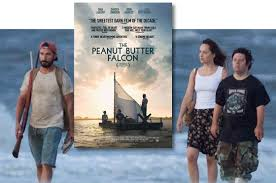
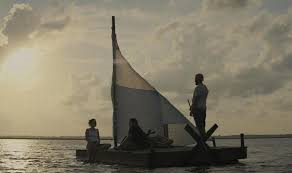



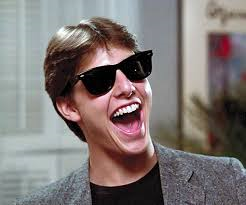
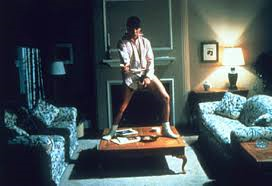
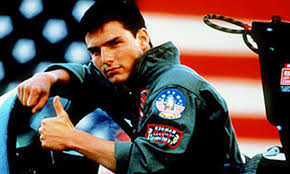
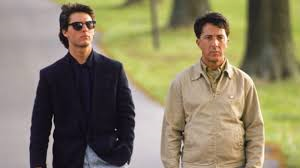
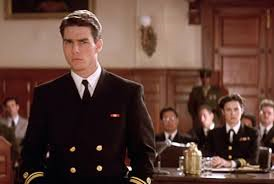
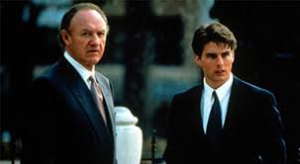

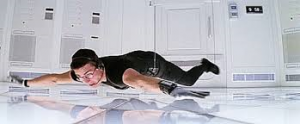
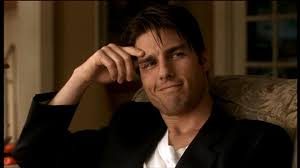
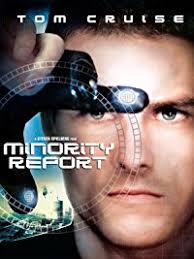
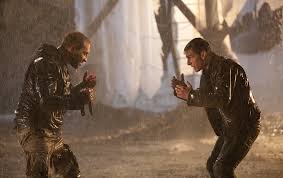

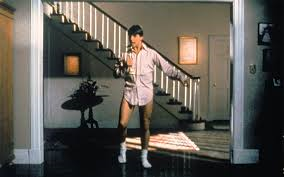

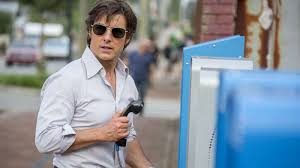

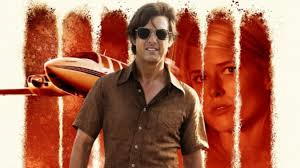
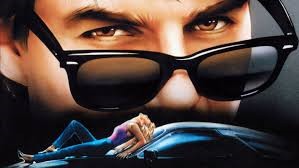

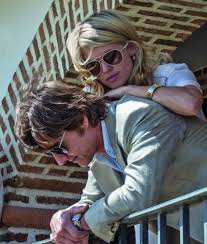
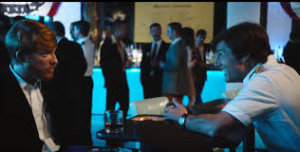
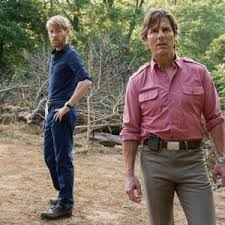
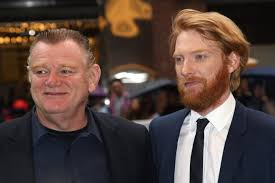



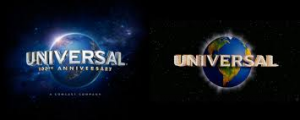

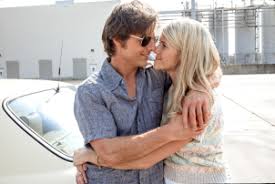
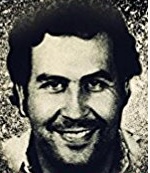
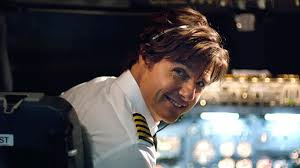
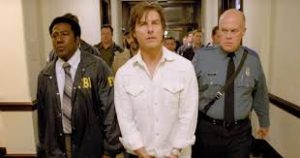 American Made is fascinating in the same way that is watching an unavoidable train wreck in progress. The entire time I was writing this review I couldn't get Glenn Frey's prescient and period perfect 1984 song out of my head, especially the lines:
American Made is fascinating in the same way that is watching an unavoidable train wreck in progress. The entire time I was writing this review I couldn't get Glenn Frey's prescient and period perfect 1984 song out of my head, especially the lines: